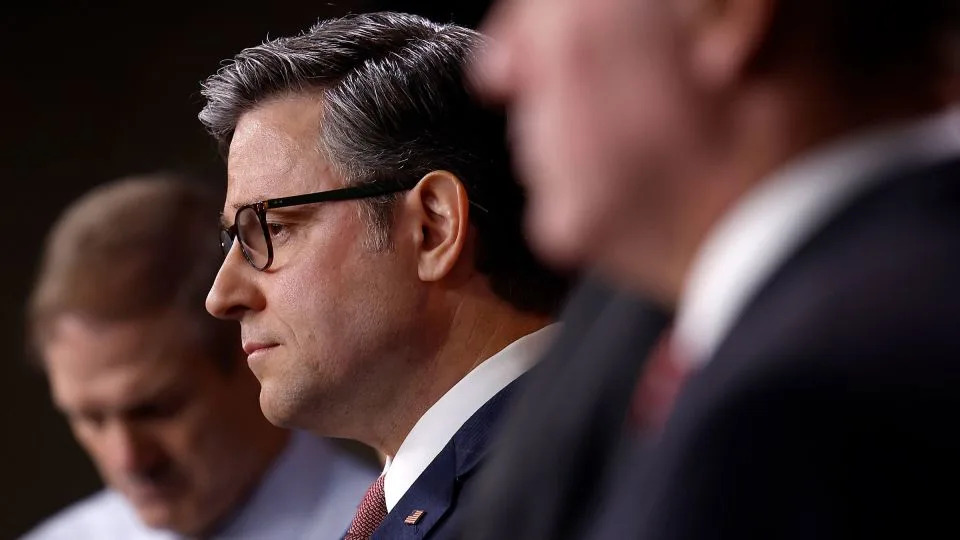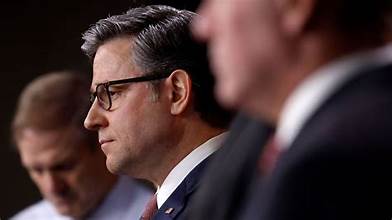GOP plots big push to extend tax cuts if Republicans sweep in November

House Speaker Mike Johnson and Senate Republicans are looking for ways to advance their agenda next year if former President Donald Trump were to win back the presidency. Top of the list: a tax overhaul.
In a meeting with Senate Republicans on Wednesday, Johnson highlighted using a procedural tool known as reconciliation to move ahead with the GOP agenda. Reconciliation allows the Senate to pass legislation with just a simple majority vote and has been used by both parties in the past to advance changes to health care and tax policy among other issues. The GOP used the process under Trump to re-write the country’s tax laws, many of which will expire at the end of next year.
Republican Sen. Thom Tillis of North Carolina said that the roughly 30-minute discussion “largely” focused on potential changes to tax policy.
“We were really talking more about future transactions, you know, the way that we’ll go about tax reform, those sorts of things, if we get a good outcome in November, that was really the extent of it,” Tillis told CNN, adding later that “what we’re talking about now is just getting everybody’s expectations right on what you can do with reconciliation, what you can’t do.”
But other senators argued that reconciliation could be used far beyond just tax changes. Sen. Kevin Cramer of North Dakota told CNN that Republicans also brainstormed how they could address the border as well as other mandatory spending besides Medicare and Social Security.
“The main idea is let’s think big. Let’s think bigger than just taxes,” Cramer said.
Sen. John Cornyn of Texas echoed this sentiment.
“He made clear they weren’t giving up on trying to contain spending,” Cornyn said of Johnson. “I suggested to him that we need to look at more than just discretionary spending. We look at mandatory non-Social Security and non-Medicare, because both Biden and Trump have said they don’t want to go there. But there’s a bunch of money to be spent on mandatory spending that he said we ought to look at that, and then the tax code, as well.”
Cornyn said one of the goals of the meeting was to demonstrate a plan to hit the ground running if Republicans sweep in 2024.
The conversation was an opportunity for Johnson and GOP senators to align themselves behind an agenda that the entire party could rally around and unite the GOP ahead of the election in November.
Johnson left the Senate GOP lunch Wednesday “encouraged,” and laid out some of the potential priorities for the next Congress if Republicans make a sweep of the House, Senate and White House.
“There’s a lot of interest in fixing the great problems that have besieged this country,” he told reporters. “I think there’s a lot of anticipation about what can be accomplished when we have unified government again.”
Johnson told reporters that there was a “lot of discussion” around policy priorities they could pass under reconciliation and that he believes they need to be “aggressive.”
“But the Democrats have used reconciliation much more aggressively than the Republican party has in recent years. And so, we’re not going to make that mistake again. We have big policy changes that we’d like to enact,” he said. “To us these are important fixes, and I think things that can be done early in the Congress.”
Specifically, Johnson indicated that they are focusing on major changes to tax policy if they have a unified government.
“There’s going to be regulatory reform, reducing the size and scope of government, and then with regard to other forward thinking, pro-growth policies, things that we can enact in a number of policy areas,” Johnson added. “That’s what we are looking at very creatively and, I think, deliberately.”
Not everyone, however, was sold on Johnson’s message.
Missouri Sen. Josh Hawley said the meeting surrounded Johnson’s efforts to “sync up the house in the Senate to plan reconciliation bills going forward.” He was “very skeptical” leaving the meeting and said the chief focus should be on “winning.”
“The Trump tax cuts expire next year, and so, I’m sure that if we have control of both chambers at the White House, we’ll try to do that through reconciliation, as you’d expect,” Hawley said. “Number one, we better focus on winning the majority, because I’ve heard this song and dance before.”
Cornyn said Johnson “wanted to tell us that there have become some preliminary discussions about reconciliation, of course, all that’s going to depend on whether we hit the trifecta or not.”
“It’s better to plan now, and I think he’s, you know, he’s got a little bit more difficult job, trying to get 450 people you know, roughly moving in the same direction,” Cornyn said.
During his weekly news conference, Senate Minority Leader Mitch McConnell said the elections in November will determine what Republicans are able to do in January.
“The first step is we need to have a Republican president, a Republican House and a Republican Senate, or there will be no reconciliation at all,” McConnell said. “It is an important tool. We hope to have an opportunity to use it and we’ll find out the first Tuesday in November.”
On a lighter note, Johnson also did a “pretty convincing Trump imitation” that provided some levity in his meeting with Senate Republicans that was otherwise bogged down by heavy policy subjects.
Cornyn was asked if the presumptive GOP presidential candidate’s name came up during the lunchtime meeting. Cornyn replied, “not really” before recalling that Johnson slipped into character at one point.
“He mimicked Trump a little bit. He’s pretty good. A pretty convincing Trump imitation,” Cornyn told reporters after the meeting.
“He’s pretty good,” Cornyn added. “An impression is what I meant.”
CNN news



